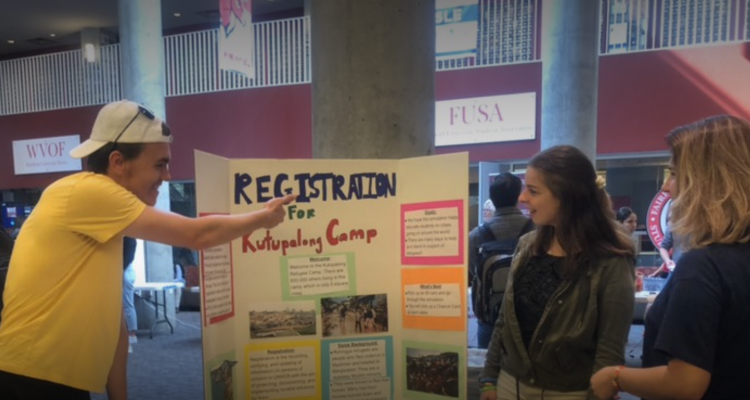The Lower Level Barone Campus Center of Fairfield University was swarming with students on Friday, Sept. 27, all of whom were there to experience a Rohingya refugee camp.
Hosted by the Jesuit Universities Humanitarian Action Network, the Rohingya Refugee Camp Simulation was designed to facilitate awareness about the recent massive migration of Rohingya people into Bangladesh.
Julie Mughal, the associate director of humanitarian action, was in charge of the simulation.
“We thought it was important to highlight the Rohingya because they are one of the world’s ‘forgotten emergencies,’” Mughal said.
Mughal went on to explain that the people of Myanmar are escaping persecution, both religious and cultural, and fleeing across the border to Bangladesh refugee camps. The situation at present can be described as dire, she said.
Those who attended the event were greeted by students of David Schmidt Ph.D.’s ethics of humanitarian class, who were presenting the simulation. Justine Sutherland ‘20, a member of Schmidt’s class, said she was surprised by the turn out.
“I didn’t expect it to be so packed. I think it’s a good thing to show people, because there’s not enough awareness. People in my class weren’t even conscious that this crisis was happening,” Sutherland remarked.
The Lower BCC was organized into 11 stations, all depicting a different aspect of life as a refugee. At the onset of the simulation, participants were given a persona of an escapee to take on as they went around to the various tables, learning about the food, mental health, hygiene and education these camps offered. After walking through, students were asked to give their feedback on their experience.
First-year Kobe Okpoti was glad to have attended the event. From Ghana, West Africa, he said that he took part in the simulation because he was interested in knowing more about the lives of refugees.
“It happens in Rwanda. There’s always war. I’ve seen it in movies, but this is a reality for people,” he said.
Also in attendance were a number of humanitarian organizations whose missions revolved around the relocation and resources offered to the Rohingya in the U.S. Among these were Save the Children, whose focus is on creating a child-friendly space in Cox’s Bazar, the world’s largest refugee camp. Participants were encouraged to flip through pictures drawn by young children in the camp, presenting the chaos through their eyes.
Josh Utter from the Jesuit Refugee Service was stationed towards the later half of the simulation. The program is based in Washington, D.C, and aims to organize, raise awareness, advocate and fundraise for the forcibly displaced Rohingya. The program employs therapists, among other services, who are trained to respond to the trauma endured by the refugees as they adjust to their new lives.
Utter spoke about how the 18,000-person cap placed on refugees in America under the current administration was affecting U.S. ability to offer assistance. The number of refugees able to be taken in by America is the lowest it has ever been.
Martine Dherte, refugee services program manager for the Connecticut Institute of Refugees and Immigrants, talked to students about how they could make a difference. Her work centers around the relocation of refugees to Bridgeport, Connecticut. She is extremely passionate about her role in the refugee crisis.
“It humbles you; there is nothing to complain about in this. It definitely grounds you, when you know people are eating crickets on the side of the road and you’re just driving in your car,” she said.
Senior Brad Cyr was posted at the very end of the refugee camp likeness. His job was to encourage reflection of those who partook in the experience.
“I think it gives people a better perspective of people who are too often ignored and not given enough attention,” he said.
Fairfield University holds similar programs annually. In the past, the school has simulated a typical Syrain refugee camp. Next semester, there are plans to recreate the experiences of evacuees from Africa.


Leave a Reply